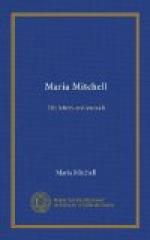“No one to-day will expect to receive a letter such as reached Sir John Herschel some years ago, asking for the writer’s horoscope to be cast; or such as he received at another time, which asked, Shall I marry? and Have I seen her?
“Nor can it be long, if the whole population is somewhat educated, that I shall be likely to receive, as I have done, applications for information as to the recovery of stolen goods, or to tell fortunes.
“When crossing the Atlantic, an Irish woman came to me and asked me if I told fortunes; and when I replied in the negative, she asked me if I were not an astronomer. I admitted that I made efforts in that direction. She then asked me what I could tell, if not fortunes. I told her that I could tell when the moon would rise, when the sun would rise, etc. She said, ‘Oh,’ in a tone which plainly said, ‘Is that all?’
“Only a few winters since, during a very mild winter, a young lad who was driving a team called out to me on the street, and said he had a question to ask me.
“I stopped; and he asked, ‘Shall we lose our ice-crop this winter?’
“It was January, and it was New England. It took very little learning and no alchemy to foretell that the month of February and the neighborhood of Boston would give ice enough; and I told him that the ice-crop would be abundant; but I was honest enough to explain to him that my outlook into the future was no better than his.
“One of the unfavorable results of the attempt to popularize science is this: the reader of popular scientific books is very likely to think that he understands the science itself, when he merely understands what some writer says about science.
“Take, for example, the method of determining the distance of the moon from the earth—one of the easiest problems in physical astronomy. The method can be told in a few sentences; yet it took a hundred years to determine it with any degree of accuracy—and a hundred years, not of the average work of mankind in science, but a hundred years during which able minds were bent to the problem.
“Still, with all the school-masters, and all the teaching, and all the books, the ignorance of the unscientific world is enormous; they are ignorant both ways—they underrate the scientific people and they overrate them. There is, on the one hand, the Irish woman who is disappointed because you cannot tell fortunes, and, on the other hand, the cultivated woman who supposes that you must know all science.
“I have a friend who wonders that I do not take my astronomical clock to pieces. She supposes that because I am an astronomer, I must be able to be a clock-maker, while I do not handle a tool if I can help it! She did not expect to take her piano to pieces because she was musical! She was as careful not to tinker it as I was not to tinker the clock, which only an expert in clock-making was prepared to handle.




